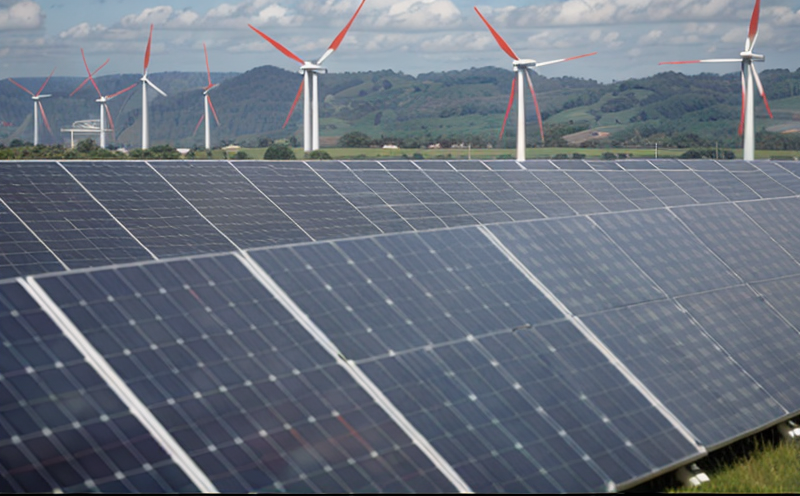Anaerobic Digestion Biogas Potential Testing
The potential of anaerobic digestion (AD) in producing biogas is a critical component in the renewable energy sector. AD offers an innovative and sustainable solution for managing organic waste, generating renewable energy, and reducing greenhouse gas emissions. This service focuses on assessing the biogas potential of various feedstocks used in AD processes.
Biogas production involves breaking down organic matter in the absence of oxygen using anaerobic bacteria. The efficiency and yield of this process are influenced by several factors including temperature, pH level, nutrient content, and microbial activity. Accurate measurement of biogas potential is essential for optimizing these conditions and ensuring the optimal use of feedstocks.
Our laboratory uses advanced analytical techniques to determine the biogas potential from different organic materials such as agricultural residues, food waste, manure, and other forms of biomass. The testing process involves several steps:
- Sample Collection: We collect feedstock samples that are representative of the material to be tested.
- Preparation: Samples undergo preliminary processing, such as drying or grinding, to ensure consistency for testing.
- Incubation: The prepared samples are incubated under controlled conditions to simulate anaerobic digestion processes.
- Gas Analysis: Biogas produced during the process is collected and analyzed using chromatographic techniques to determine its composition, including methane, carbon dioxide, hydrogen sulfide, and other trace gases.
- Yield Calculation: The volume of biogas produced over a given period is calculated to assess the potential yield from each feedstock.
By providing precise biogas potential data, our service supports stakeholders in making informed decisions regarding feedstock selection and AD process optimization. This information is invaluable for quality managers, R&D engineers, compliance officers, and procurement teams aiming to enhance sustainability within their operations.
The testing adheres to international standards such as ISO 10529:2007 and EN 14836:2007, ensuring accurate and reliable results. These standards provide a framework for evaluating the biogas potential of organic feedstocks, thereby supporting compliance with regulatory requirements.
Our team of experts ensures that all testing procedures are conducted in accordance with best practices, using state-of-the-art equipment to deliver high-quality data. This commitment to precision and accuracy guarantees that our clients receive actionable insights into their AD processes.
Applied Standards
Our laboratory adheres strictly to international standards when conducting anaerobic digestion biogas potential testing:
- ISO 10529:2007 - Method for Determination of Biogas Potential from Organic Substances
- EN 14836:2007 - Technical Specification for the Production, Use and Disposal of Biowaste and Biodegradable Waste in Anaerobic Digestion Plants
- ASTM D5526-19 - Standard Test Method for Determination of Biogas Potential from Organic Substances
- IEC 62301 - Technical Specification for the Production, Use and Disposal of Biowaste and Biodegradable Waste in Anaerobic Digestion Plants
These standards provide a robust framework for ensuring accurate and consistent testing results. By following these guidelines, we ensure that our clients receive reliable data that meets industry benchmarks.
The use of such standardized methods is crucial for comparing test results across different laboratories and ensuring consistency in quality assurance processes. This alignment with international best practices also supports compliance with regulatory requirements, which are essential for the successful implementation of renewable energy projects.
Quality and Reliability Assurance
We understand the importance of accurate and reliable biogas potential testing in the renewable energy sector. To maintain high standards, we employ rigorous quality control measures:
- Calibration: All equipment used for gas analysis is regularly calibrated to ensure accuracy.
- Reproducibility: Testing procedures are conducted multiple times to verify reproducibility and consistency of results.
- Peer Review: Results undergo thorough peer review by our team of experts before being reported.
- Traceability: All testing processes follow traceable protocols, ensuring that results can be independently verified.
- Documentation: Detailed documentation is maintained for all tests conducted, including sample details and processing conditions.
- Training: Our staff undergo continuous training to stay updated with the latest techniques and methodologies in AD biogas potential testing.
- Accreditation: The laboratory is ISO/IEC 17025 accredited, ensuring that all services meet internationally recognized standards for competence and quality.
These measures ensure that our clients receive dependable data that can be used with confidence in decision-making processes. Our commitment to excellence guarantees that you get the best possible results from your AD biogas potential testing.
Customer Impact and Satisfaction
The success of renewable energy projects depends heavily on accurate biogas potential data. By providing precise measurements, our service directly impacts customer satisfaction in several ways:
- Optimization of Processes: Accurate testing helps clients optimize their AD processes for maximum efficiency and yield.
- Cost Reduction: By selecting the most suitable feedstocks, clients can reduce operational costs associated with raw material procurement.
- Enhanced Sustainability: Our testing supports sustainable practices by recommending feedstocks that are both abundant and environmentally friendly.
- Regulatory Compliance: Reliable data helps clients meet regulatory requirements, ensuring smooth compliance with local and international standards.
- Innovation: Real-world testing results inform R&D efforts, driving innovation in renewable energy technologies.
- Investor Confidence: Accurate data enhances investor confidence by demonstrating the financial viability of renewable projects.
Customer satisfaction is a top priority for us. We work closely with our clients to understand their specific needs and provide tailored solutions that meet those requirements. Our dedication to quality and reliability ensures that you receive the best possible outcomes from your AD biogas potential testing.





